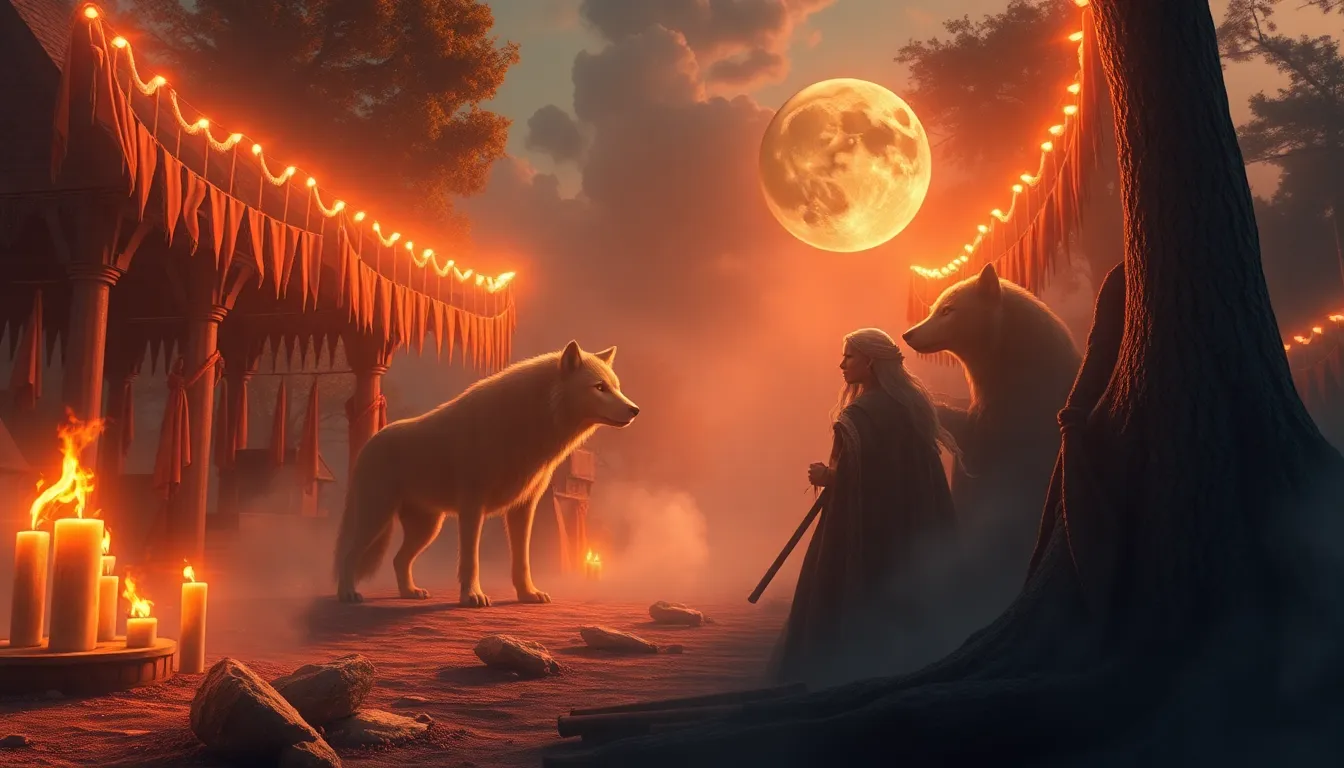The Significance of the Lykaia Festival: A Celebration of the Wolf
I. Introduction
The Lykaia Festival was a significant event in ancient Greek culture, held in honor of the god Zeus and the mythical figure Lykaon. This festival celebrated the wolf, a creature deeply rooted in the mythology and symbolism of ancient Greece. With origins that stretch back to ancient Arcadia, the Lykaia Festival intertwined religious practices with local customs, making it a vibrant part of the cultural tapestry of the time.
The wolf held a multifaceted significance in ancient Greek culture, symbolizing both ferocity and protection. Its representation in mythology and rituals reflected the duality of nature and the complex relationship humans had with the wilderness.
II. Historical Background of the Lykaia Festival
The Lykaia Festival took place in the mountainous region of Arcadia, particularly around Mount Lykaion. This area was known for its rugged terrain and dense forests, which provided a natural habitat for wolves and other wildlife. The geographical setting influenced the culture, traditions, and myths surrounding the festival.
Arcadia was often depicted as a pastoral paradise in ancient Greek literature, embodying the ideal of a harmonious relationship between humans and nature. The Lykaia Festival was closely connected to this ideal, celebrating the life force of the land and its creatures.
Historical accounts from writers such as Pausanias provide insights into the festival’s activities and significance. Archaeological findings, including altars and inscriptions, have helped historians piece together the practices and beliefs associated with the Lykaia Festival.
III. Mythological Foundations of the Festival
At the heart of the Lykaia Festival is the legend of Lykaon, a king of Arcadia who is said to have tested Zeus’s divinity by serving him a dish made from human flesh. As punishment, Zeus transformed Lykaon into a wolf, a myth that illustrates themes of transformation, punishment, and the nature of humanity.
The relationship between the gods and wolves in Greek mythology is complex. Wolves were often seen as messengers of the gods or as symbols of divine retribution. This connection is evident in various myths where wolves act as protectors or avengers, embodying the dual nature of the wilderness.
The symbolism of transformation and duality is prevalent in the festival’s rituals, reflecting the belief that humans could embody both civilized and wild aspects. The Lykaia Festival celebrated this duality, allowing participants to engage with their primal instincts while honoring the divine.
IV. Rituals and Traditions of the Lykaia Festival
The Lykaia Festival was marked by a series of rituals that highlighted its religious significance. Key components of the festival included:
- Animal Sacrifice: The festival often involved the sacrifice of animals, particularly wolves or sheep, as offerings to Zeus.
- Feasting: After the sacrifices, communal feasting took place, fostering unity among participants and honoring the deity.
- Music and Dance: Rituals included music and dance performances that celebrated the connection to nature and the divine.
These rituals were not only acts of devotion but also essential for maintaining the social fabric of the community. They reinforced cultural identity and provided an avenue for expressing gratitude to the gods.
V. The Cultural Impact of the Lykaia Festival
The Lykaia Festival significantly influenced local customs and traditions in Arcadia and beyond. It served as a model for other festivals, emphasizing the importance of nature and the divine in human life.
Connections to other ancient festivals, such as the Dionysia and the Panathenaea, can be seen in the shared themes of sacrifice, celebration, and community. The Lykaia Festival also left a lasting legacy, inspiring later cultural expressions that celebrated the bond between humanity and nature.
VI. The Wolf as a Symbol in Ancient Greece
The wolf’s representation in ancient Greek art and literature reveals its complex symbolism. Often depicted in mythology and pottery, the wolf served as a reminder of both the wildness of nature and the protective instincts inherent in society.
The wolf’s dual nature—as both a protector and a predator—played a crucial role in its symbolism. It was revered as a guardian of the flock and feared as a hunter of the weak. This duality reflects the moral implications of the wolf in Greek mythology, serving as a metaphor for the balance between civilization and the wild.
VII. Contemporary Relevance of the Lykaia Festival
In modern times, interpretations and revivals of the Lykaia Festival have emerged, reflecting a renewed interest in ancient traditions and environmental consciousness. Contemporary celebrations often focus on:
- Wildlife Conservation: Highlighting the significance of wolves in ecosystems and advocating for their protection.
- Cultural Heritage: Promoting awareness of ancient Greek culture and its relevance to contemporary society.
- Community Engagement: Encouraging local communities to participate in celebrations that honor their historical roots.
The significance of the wolf in contemporary culture has evolved, with increasing recognition of its ecological role and symbolic importance. Festivals like Lykaia serve as reminders of the interconnectedness of nature and humanity.
VIII. Conclusion
The historical and cultural significance of the Lykaia Festival is profound, reflecting ancient Greek values and beliefs. It symbolizes the enduring connection between humanity and the natural world, emphasizing the importance of rituals that honor both the divine and the earthly.
As we reflect on the legacy of the Lykaia Festival, it becomes clear that celebrating cultural traditions fosters a sense of identity and belonging. In a world increasingly disconnected from nature, the teachings of ancient festivals like Lykaia remind us of the importance of respecting and celebrating the wilderness and its creatures.




